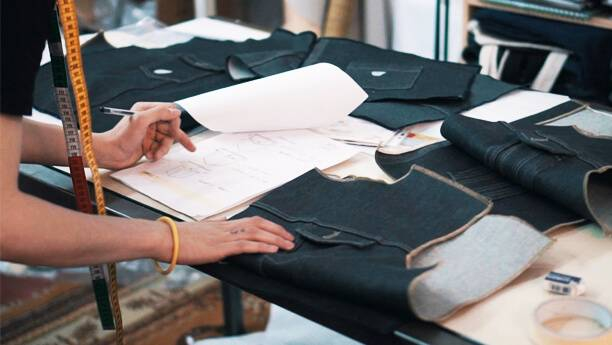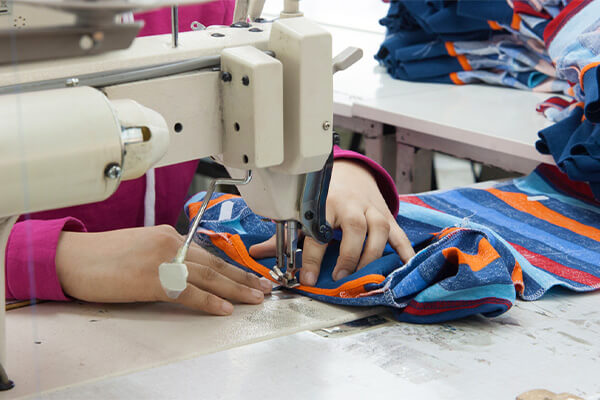Order online or call us +86-136 3158 0453
Order online or call us +86-136 3158 0453
Views: 366 Author: Site Editor Publish Time: 2025-10-23 Origin: Site








In the ever-evolving fashion industry, growth is no longer just about creativity — it’s about execution. Top brands understand that behind every successful collection stands a clothing manufacturer capable of transforming vision into reality. The synergy between innovative design and reliable production forms the backbone of sustainable brand growth.
As competition intensifies, custom garment production has emerged as a key differentiator — enabling brands to express identity, maintain quality, and scale efficiently.

Custom garment production allows brands to control every detail — from fabric selection to final stitch. Unlike mass production, customization offers flexibility, exclusivity, and a stronger connection with target audiences.
Partnering with an experienced clothing manufacturer ensures that every design element aligns with your brand DNA, while maintaining consistency across global markets. For many emerging and established labels, this tailored approach has become a powerful growth engine.
A skilled clothing manufacturer does far more than produce apparel. They act as strategic partners who understand your product goals, supply chain priorities, and sustainability commitments.
By providing OEM and ODM clothing solutions, manufacturers help brands scale from concept to full production while minimizing lead times and maintaining strict quality control in clothing manufacturing. This partnership approach transforms production into a key element of brand strategy.
The journey from design sketch to finished product is complex yet precise. The apparel manufacturing process typically involves:
Design consultation and sampling
Fabric sourcing and testing
Pattern development and grading
Cutting, sewing, and finishing
Quality inspection and packaging
Each stage requires specialized expertise and advanced equipment — which is why choosing the right B2B garment factory can make or break production efficiency.

Private label clothing allows brands to control pricing, quality, and exclusivity — without managing a full-scale factory operation.
A reliable clothing manufacturer that provides private label solutions gives fashion brands the flexibility to develop signature styles under their own label while ensuring that production standards remain high. This model empowers businesses to expand into new product categories without overextending resources.
Today’s consumers care deeply about where and how their clothes are made. Sustainability isn’t just a trend — it’s a growth driver.
Top clothing manufacturers have embraced sustainable manufacturing by adopting eco-friendly fabrics, waste reduction techniques, and renewable energy practices. By aligning with such partners, brands can strengthen their ethical reputation and appeal to environmentally conscious customers.
Modern clothing manufacturers leverage technology to achieve precision and consistency. From automated cutting machines to digital pattern-making software, innovation ensures faster turnaround and higher accuracy.
Moreover, data-driven production enables real-time quality tracking. This minimizes rework, boosts productivity, and ensures every garment meets premium brand standards.
For niche or growing brands, small batch production offers agility — the ability to test designs, adjust based on feedback, and avoid inventory risk.
Many B2B garment factories now offer flexible MOQs (Minimum Order Quantities) to support smaller runs without compromising quality. This flexibility is especially valuable for fashion startups exploring market fit or seasonal collections.
Efficiency across the fashion supply chain determines how fast brands can respond to market trends.
A dependable clothing manufacturer integrates material sourcing, production, and logistics under one streamlined system.
This not only reduces lead time but also provides greater transparency — a crucial factor in maintaining buyer trust and long-term partnerships.
High-quality garment production directly enhances brand equity. Consistency in sizing, materials, and workmanship builds customer confidence, which translates into loyalty and word-of-mouth marketing.
By aligning production capabilities with a clear brand growth strategy, brands unlock scalability — expanding into new regions, categories, and distribution channels without compromising quality or delivery timelines.
Before entering any partnership, brands should evaluate potential manufacturers based on:
Production expertise (OEM & ODM experience)
Compliance certifications (ISO, WRAP, BSCI, etc.)
Sustainability practices
Communication transparency
Product sampling quality and lead time
A well-chosen clothing manufacturer acts not as a vendor, but as a long-term strategic partner invested in your success.

The next decade will see further integration of technology, sustainability, and personalization. AI-driven design assistance, 3D sampling, and smart fabrics will redefine how brands collaborate with clothing manufacturers.
Those who adapt early — both brands and factories — will gain a lasting competitive edge in speed, quality, and brand storytelling.
Beyond fabric and fashion lies strategy. The right clothing manufacturer helps brands unlock efficiency, sustainability, and identity — transforming production into a pillar of success.
For growing labels, collaboration with an experienced B2B garment factory means more than meeting deadlines — it’s about creating a foundation for long-term global impact.
Q1: What’s the difference between OEM and ODM clothing manufacturing?
OEM (Original Equipment Manufacturing) produces garments based on your designs, while ODM (Original Design Manufacturing) includes design support — ideal for brands seeking ready-to-market collections.
Q2: How can I find a reliable clothing manufacturer for my brand?
Look for experience, quality certifications, transparent communication, and strong client references. A good B2B garment factory should also provide sampling and small batch options.
Q3: Is sustainable garment production more expensive?
Initially, it may cost slightly more, but sustainable practices often lead to long-term savings through efficiency, material optimization, and brand trust.
Q4: How does small batch production benefit startups?
It allows emerging brands to test products, reduce inventory risks, and make fast market adjustments without committing to massive production runs.
Q5: What role does quality control play in brand reputation?
Consistent quality control in clothing manufacturing ensures customer satisfaction, reduces returns, and reinforces your brand’s premium image.
Rm 423, LiangJi Building, Longhua District, Shenzhen, Guangdong,China
Copyright © 2023 Doven Garments. All Rights Reserved.Privacy Policy | Sitemap | Support By Leadong